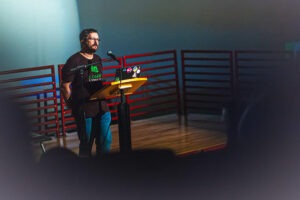Europe wants to buy European, America wants to deregulate the world, China hacks the commons. But code knows no borders… unless we let it.

Geopolitics increasingly pushes the technology landscape towards local control. Europe is debating if it should “buy European.” Washington pressures allies to stop big tech regulation. Chinese hackers got caught trying to slip back doors into open source projects. Sanctions forced Linus Torvalds to bar Russian maintainers from controlling kernel subsystems.
In this climate, one might ask: can open source still be global?
Open Source Has Always Been Global
The answer lies in what open source really is: a model of control — not by vendors or governments, but by users. Anyone can inspect, improve, and adapt the code.
I have always appreciated the “hack on copyright” that is the copyleft licenses. Once free, code will remain free, unable to lock users in. It is why I prefer strong copyleft over more permissive licenses (fight me on this!). Yet, it’s the transfer of control from vendor to user that makes open source uniquely aligned with the global push for technological sovereignty. Unlike proprietary cloud platforms, open source doesn’t lock nations or organizations into someone else’s road map.
Open for the Future
The increasing dominance of big tech firms mirrors the global trend towards authoritarianism. But, just like a Versailles-style rentier society slows progress, we need to reduce tech dominance to bring an increase in innovation and prosperity.
Open source has a key role to play here, too. Open standards and reduced vendor lock-in are transformative. This is not theoretical. Open source already underpins trillions in economic value. The world’s digital infrastructure — from phones to clouds to AI — runs on it. Open source delivers.
We should double down on it — not hold back. Take this as a call to action to our community: keep fighting for our global, diverse, and welcoming community. Lose the advantage of global collaboration, and we lose the creativity and knowledge that make it so powerful. Even Google, Amazon, or Apple know that most of the smartest people don’t work for them!
What to Do?
The public sector should learn the same lesson. Collaboration, not control, gives the best results.
In the early 2000s we saw governments build “local” Linux distributions as a sovereignty fix. The result was only further fragmentation, duplication, and disconnected communities. Today, some public sector organizations are on a similar path, aiming to develop software themselves. While the public sector can be great at defining guardrails and creating space for innovation, I’m worried that much of the current efforts will merely turn a lot of money into meetings, to paraphrase Bert Hubert.
Worse, all the talk about “building alternatives” serves as a great excuse for budget holders across the public sector to delay any actual deployments. Then, while we wait for that “perfect” solution to be built, billions of taxpayer money continues to be funneled into big tech products. This creates jobs and “shareholder value” in Silicon Valley rather than open, interoperable, and digitally sovereign technology.
I would urge the public sector to follow the same proven strategy the US and China rely on to boost industry: use the purchasing power of the public sector to give open source vendors the credibility and scale to compete.
This helps both the local technology and contributes to a global, distributed, and standards-based digital ecosystem.
Stay Open Source
The way forward is not to shrink behind national borders but to double down on international cooperation. Governments should recognize that open source already preserves sovereignty while enabling collaboration. Those who wall themselves off will not gain independence — they’ll simply fall behind.
Open source can deliver sovereignty for Europe, the US, China, and beyond. But the projects themselves must stay global, open, diverse, and welcoming. Because the day open source stops being global is the day it stops being open.

Jos Poortvliet is co-founder and Communications Director at Nextcloud. He is a long time technology enthusiast and all-things-open evangelist. He has previously been community manager at SUSE and worked as business consultant at government, finance and telecom companies in the Netherlands. He is based in Berlin and loves cooking for friends, family and colleagues.





